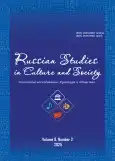Artificial Intelligence – Subject and Actor of Value Space
- Authors: Belikova E.K.1
-
Affiliations:
- Lomonosov Moscow State University
- Issue: Vol 9, No 2 (2025)
- Pages: 4-19
- Section: Статьи
- Published: 30.06.2025
- URL: https://journal-vniispk.ru/2576-9782/article/view/301332
- DOI: https://doi.org/10.12731/2576-9782-2025-9-2-242
- EDN: https://elibrary.ru/QIZAWM
- ID: 301332
Cite item
Full Text
Abstract
The article is devoted to the analysis of the role of artificial intelligence (AI) in the social, cultural and value space. It is noted that the initial status of AI as a technological phenomenon was the status of an object influenced by a person who created it and sets its action parameters. Using methods of analysis, synthesis, observation, description, interpretation and others, it is revealed that AI occupies a special position in comparison with other technological phenomena, having ceased to be only an object of the value space, having become a cultural phenomenon and having acquired the properties of a subject. AI itself has value, transmits a number of values (technological efficiency, knowledge, intelligence, education, science, ideas, creativity, etc.). In this, as well as in the formation of the AI culture as a special cultural layer, the subjectivity of AI in the value space is manifested. Further development of AI as a component of the value space is manifested in the fact that it is developing the properties of an actor. According to the actor-network theory of B. Latour, AI is a full-fledged actor of the social space, interacting with other actors and being an active agent. In the value space, the role of an actor is not fully performed by AI in its weak version. This role would be fully performed by a strong AI, which has not yet been created. It is concluded that AI is a complex phenomenon of the cultural field, combining the role of an object, subject and actor of the value space.
About the authors
Evgeniya K. Belikova
Lomonosov Moscow State University
Author for correspondence.
Email: jbelikova@list.ru
ORCID iD: 0009-0001-7575-024X
Associate Professor, Department of English Language, PhD in Cultural Studies
Russian Federation, 1, Leninskie Gory, Moscow, 119991, Russian FederationReferences
- Abdullaev E.A.O. Artificial Intelligence and Its Impact on the Economy and Business. Young Scientist, 2023, no. 6 (453), рр. 2-3.
- Aboev V.V. Legal Analysis of the Problems of Defining Artificial Intelligence as a Subject of Law. Science Bulletin, 2024, vol. 4, no. 4 (73), рр. 118-121.
- Berdyaev N.A. Man and Machine (Problem of Sociology and Metaphysics of Technology). Path, 1933, no. 38, рр. 3-38.
- Berina A.B. Artificial Intelligence as a Subject of Copyright. In: Information Resource Management: Proc. of the XX Int. Res. and Pract. Conf. Minsk: Ak. Manage. under the President of the Republic of Belarus, 2024, рр. 47-48.
- Vasiliev P.V. Media Company Management: Artificial Intelligence as a New Subject in Media Production. Economy and Paradigm of the New Time, 2024, no. 10 (31), рр. 5-15.
- Gabrielyan A.A. Artificial Intelligence as a Communicative Subject. In: Modern Humanitarian Knowledge on the Problems of Social Development: Materials of the All-Russian Conf. Stavropol: SKSI, 2024, рр. 66-69.
- Gribkov A.A. Non-Subject Artificial Intelligence in the System of Subject-Object Relations. Philosophical Thought, 2024, no. 5, рр. 11-21. https://doi.org/10.25136/2409-8728.2024.5.70817.
- Esev K.E. Artificial intelligence in the system of subjects of civil procedural legal relations. In: Current areas of scientific research: development prospects: proc. II all-Russian scientific-practical. conf. Cheboksary: Interactive plus, 2024, рp. 199-204.
- Artificial intelligence is ready for mass murder: Three ways to destroy humanity are named. 22.05.2023 URL: https://dzen.ru/a/ZGp1X6pd2g3kEZCz (accessed: 14.04.2025).
- Kartaslov.ru – Map of words and expressions of the Russian language: dictionary. URL: https://kartaslov.ru (accessed: 14.04.2025).
- Krylova M.N. Social threats caused by artificial intelligence and society's response to them. Studia Humanitatis, 2024, no. 1, рр. 19.
- Latour B. Reassembling the social: introduction to actor-network theory / edited by S. Gavrilenko. Moscow: HSE Publ., 2014, 384 p.
- Pletnev A.V. Artificial intelligence as an actor in the political system of an anomic society. In: Digital society – a new format of social reality: structures, processes and development trends: Proc. All-Russian Scientific Conf.; ed. N.G. Skvortsov, Yu.V. Asochakov. SPb.: Skifiya-print, 2020, pp. 86-87.
- Soloviev V.S. Works: in 2 volumes. V. 1 / Comp., general. editors and introduction. art. A.F. Losev and A.V. Gulyga; notes. S.L. Kravets et al. Moscow: Mysl, 1988, 892 p.
- Man in the socio-cultural dimension: monograph / I.V. Glushko, T.M. Zueva, M.N. Krylova, I.M. Lavrukhina, A.V. Yarovoy. Zernograd: ACII, 2022, 222 p.
- Shabanov G.A. Artificial intelligence as a subject of the educational process in the university. Higher education today, 2024, no. 1, рр. 24-28. https://doi.org/10.18137/RNU.HET.24.01.P.024
- Yasybaev B.I. Artificial Intelligence as a Subject of Labor Legal Relations. In: Legal Science in the Context of Modern Challenges: Proc. III International Scientific and Practical Conf. Ufa: Research Institute of Problems of the Rule of Law State, 2024, рр. 252-257.
Supplementary files










